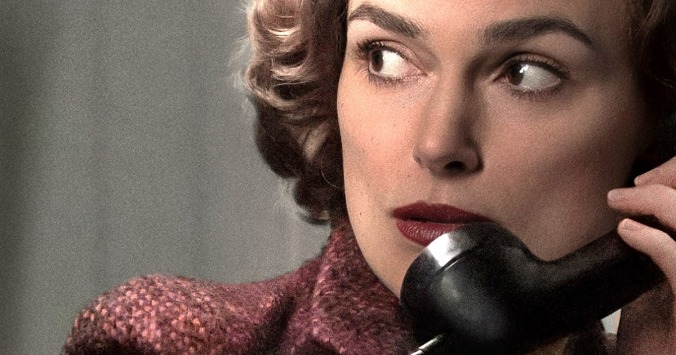Boston Strangler review: Keira Knightley tracks an infamous killer
Despite the talents of Knightley, Carrie Coon, and Chris Cooper, Hulu's true crime film adaptation never cracks the case

For decades, police procedurals were a staple of the cinematic diet. Whether ripped from the headlines or crafted solely from writers’ imaginations, viewers could count on crime dramas rooted less in mystery than the long arm of justice finally winning out—through the investigative prowess of law enforcement, crusading journalists, or both.
Ironically, as true crime has surged in the nonfiction realm, particularly on streaming platforms, single-serving cinematic treatments have waned. In typical American fashion, when viewers settle down with murder these days, it seems they’d prefer a plus-sized portion, thank you very much.
Into this space enters the admirably ambitious but hopelessly misshapen Hulu original Boston Strangler, which tells the story of reporting on the murders of 13 single women, between the ages of 19 and 85, over an 18-month period spanning 1962 to 1964. Written and directed by Matt Ruskin, the movie attempts to serve multiple narrative masters, but ends up coming across as vague and indistinct.
Loretta McLaughlin (Keira Knightley) is a lifestyle reporter for the Boston Record American with aspirations of writing something other than a review of the latest toaster. With no mentor or clear pathway for professional advancement, she’s left to passive-aggressively post, on a newsroom bulletin board, clipped articles from other papers who’ve scooped her and her colleagues.
Eventually, Loretta argues her way into covering a string of unsolved local murders on her own time. When she confirms certain shared details, the connected nature of the killings launches a media frenzy. As more murders occur, Loretta is paired with Jean Cole (Carrie Coon) by her editor Jack MacLaine (Chris Cooper). Together, the duo identify a number of suspects and connected parties, including Albert DeSalvo (David Dastmalchian), Daniel Marsh (Ryan Winkles) and George Nassar (Greg Vrotsos).
Along the way, Loretta and Jean—both married and with children, but utterly dedicated to their work—grapple with a fair amount of the garden-variety sexism of the era. They also face structural pushback from comfortably aligned power systems when their reporting reveals how a lack of interdepartmental information sharing and basic professional follow-through by police departments is impacting the trajectory (and validity) of the investigation.
Ruskin’s filmography includes the well-received Crown Heights, a biographical drama starring Lakeith Stanfield and Nnamdi Asomugha about a wrongfully convicted murderer. Here Ruskin seeks to unpack a sprawling, complicated case, and its intersection with social constructs.
On a technical level, he delivers fine. Cinematographer Ben Kutchins contributes engaging work. And the movie’s production design and costuming communicate—in their own centering of functionality and chic drabness, respectively—the oppressiveness of the way things are and friction over changing times.
Ruskin also knows how to convey essential background in economic strokes. Two scenes with blowhard Boston Police Department Commissioner Ed McNamara (Bill Camp)—including one with him surrounded by popping flashbulbs, telling reporters they’re going to catch the parties responsible for the murders—tell us all we need to know about law enforcement’s prioritization of image protection over action.
Still, with its intense focus on jurisdictional jockeying and intrepid reporting, Boston Strangler exists in a tangled thicket of plotting and general period mood. Its greater narrative purpose never comes into focus and the characters, as presented here, offer only thumbnail depth.
None of the deaths mean much at all, since we’re not asked to sympathize with the victims. That wouldn’t necessarily matter, as the numbers mount, if the primary audience stand-ins were more compelling. While the film does a good job of fleshing out the pressure and demands Loretta and Jean are under, even they seem somewhat unknowable as multidimensional people. They simply represent a type. Knightley, and especially Coon, provide what lift they can, but are let down by what’s on the page.
The relationship which most works is a sub rosa one between Loretta and Detective Conley (Alessandro Nivola), who meet occasionally to share details about the murders. Possessing begrudging mutual respect, each appreciates the other’s doggedness as well as the degree to which the other’s work can extend beyond the parameters of their own.
Heavy on the telling versus the showing, Ruskin’s film lacks compelling, standout scenes. For long passages it simply plods along, offering perfunctory, surface-level engagement. When things require an informational jolt, a phone call from a New York police officer or a sudden meet-up with a talkative local cop from another parish does the trick.
Thus, the film is perhaps most interesting around the edges—for things not strictly on the screen. In its own glancing way, this new version could serve as a bookend in a fascinating sociological case study on the evolution of true crime entertainment, when stacked up alongside 1968’s The Boston Strangler.
That film, directed by Richard Fleischer and starring Tony Curtis (in a Golden Globe-nominated performance), centered its story around the chief detective, John Bottomly (Henry Fonda), who coaxed a controversial confession out of DeSalvo. Widely derided for its dubious framing and fast-and-loose relationship with known historical facts, it also featured a poster with a tagline (“Why did 13 women willingly open their doors to the Boston Strangler?”) that would surely induce no small amount of online scolding today.
The 2023 version of this tale centers the women who broke the story, and reported it out. It could and should be more interesting, but instead it offers no new illumination—just a different muddy version of a complex case.
(Boston Strangler starts streaming on Hulu on March 17)